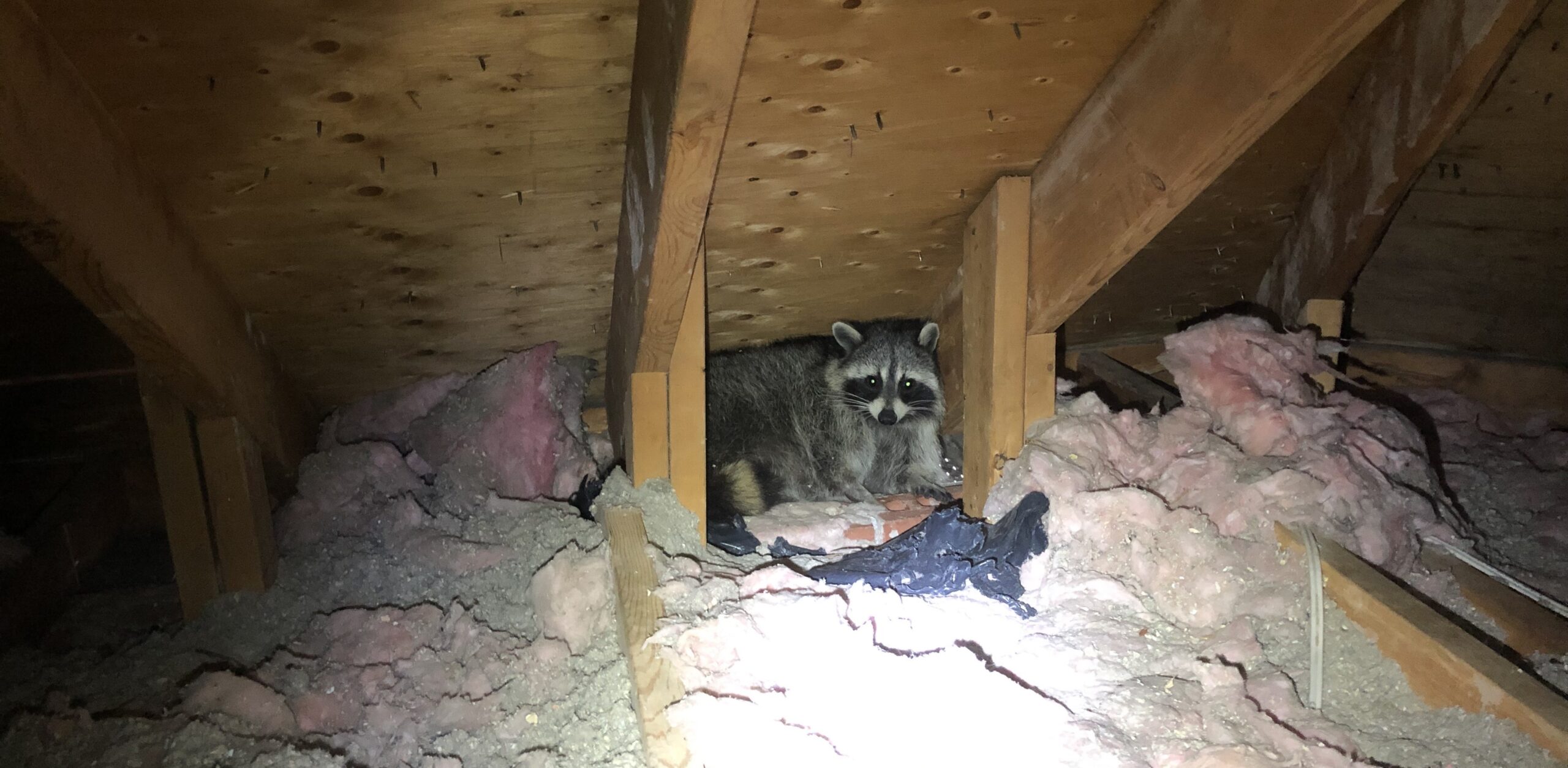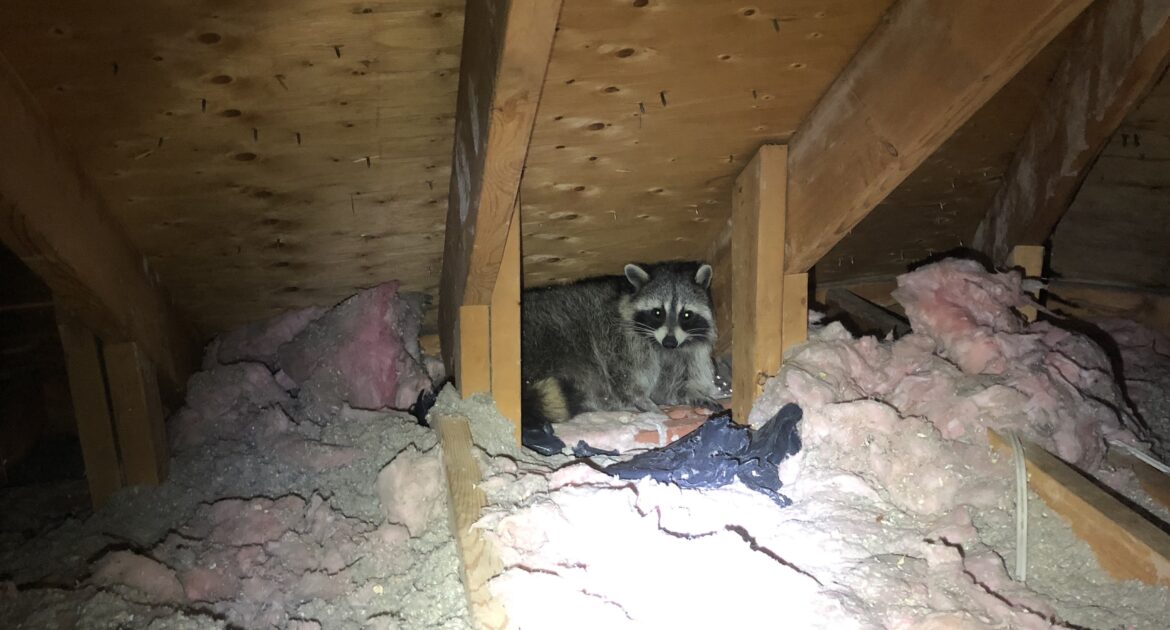Raccoons are clever creatures that can cause significant trouble for homeowners in Minneapolis. They’re drawn to properties that provide easy access to food and shelter, often targeting garbage cans, pet food, and unsealed entry points. Understanding what attracts raccoons is essential for keeping them at bay.
These nocturnal animals are opportunistic feeders, meaning they will take advantage of any available resources. To effectively prevent raccoons from entering your home, it is crucial to secure all potential food sources and fortify possible entry points. If you suspect raccoons have already infiltrated your property, knowing who to call for raccoon removal is your next step.
Skedaddle’s professional wildlife control services can provide humane and efficient solutions, ensuring these animals are safely removed and do not return. This guide aims to equip you with the knowledge needed to protect your home and maintain peace of mind. Taking proactive measures now will save you from the hassle and potential damages these animals can cause. With expert help and effective strategies, you can keep your property raccoon-free and ensure a safe environment for your family.
What Attracts Raccoons to Your Property?
Understanding what attracts raccoons to your property is the first step in keeping them away. Raccoons are opportunistic feeders, meaning they aren’t picky when it comes to their diet. They are drawn to accessible food sources, so if your garbage bins aren’t secure or if you leave pet food outside, you’re essentially rolling out the red carpet for them. Bird feeders can also be a significant attractant, as the seeds offer an easy meal.
Water sources can be another reason raccoons are hanging around. Ponds, fountains, or even birdbaths can attract them, especially during dry spells. These animals are also known to be drawn to compost piles, particularly those that contain food scraps. Ensuring these potential attractants are dealt with will significantly reduce the chances of raccoons frequenting your property.
Lastly, raccoons seek shelter, and your property may offer perfect hiding spots. Dense vegetation, woodpiles, and even attics can serve as convenient places for raccoons to nest. By eliminating these attractants, you’ll make your property less appealing to these pesky intruders.
Secure Your Garbage and Compost
Securing your garbage and compost is crucial in deterring raccoons. These animals have strong, dexterous paws that enable them to open lids and rummage through the contents. Therefore, standard garbage cans won’t cut it. You need containers with locks or heavy-duty lids that raccoons can’t easily pry open. Place your garbage cans in a secure area, such as a locked shed or garage, to add an extra layer of protection.
Compost bins should also be raccoon-proof. Use bins with tight-fitting lids and ensure they are made of sturdy materials that raccoons can’t chew through. Additionally, avoid adding food scraps to your compost if possible. Stick to yard waste like leaves and grass clippings to make your compost less enticing.
Consider the times when you put out your garbage for collection. If possible, avoid leaving it out overnight, as this is prime scavenging time for raccoons. By only putting garbage out in the morning, you’ll reduce the window of opportunity for raccoons to rummage through it.
Eliminate Potential Shelters
Raccoons are always on the lookout for cozy places to nest, and your property might offer just that. To prevent them from making themselves at home, you’ll need to eliminate potential shelters. Start by inspecting the exterior of your home for any gaps, holes, or openings that could serve as entry points. Pay close attention to areas around the roof, vents, and foundation. Seal these openings using durable materials like steel mesh or hardware cloth.
Outdoor structures, such as sheds and garages, should also be assessed for vulnerabilities. Ensure doors and windows are closed securely and that there are no gaps or holes. Woodpiles, stacked lumber, and dense vegetation can provide ideal hiding spots for raccoons, so keep these areas tidy and well-maintained.
If you have a chimney, install a chimney cap to prevent raccoons from entering through it. Additionally, trim tree branches that are close to your roof, as raccoons can use them as bridges to access your home. By eliminating these potential shelters, you’ll make your property far less inviting to raccoons.
Use Motion-Activated Lights and Sprinklers
Motion-activated lights and sprinklers can be highly effective in deterring raccoons. These animals are nocturnal and prefer to operate under the cover of darkness. Motion-activated lights can startle and scare them away, making your property less attractive for nighttime prowls. Place these lights around areas where raccoons are likely to enter or explore, such as near garbage cans or entry points to your home.
Motion-activated sprinklers add another layer of defense. When a raccoon triggers the sensor, it gets an unexpected burst of water, which can be enough to discourage future visits. Position these sprinklers strategically around your yard, particularly in areas where you’ve noticed raccoon activity.
Combining motion-activated lights and sprinklers provides a one-two punch that can effectively deter raccoons. These measures not only make your property less appealing but also condition raccoons to associate it with unpleasant surprises, encouraging them to seek food and shelter elsewhere.
Secure Pet Food and Bird Feeders
Pet food and bird feeders are common attractants for raccoons. If you have pets, ensure their food is not left outside overnight. Bring bowls indoors after your pets have finished eating to prevent raccoons from getting a free meal. Store pet food in airtight containers inside your home to keep it safe from raccoons’ keen sense of smell.
Bird feeders can also attract raccoons, especially if they are easy to access. Use feeders designed to be raccoon-proof, such as those with weight-sensitive perches that close off access when a heavier animal tries to use them. Place feeders on poles with baffles to prevent raccoons from climbing up.
Regularly clean up any spilled seed or food around feeders, as this can also attract raccoons. By managing pet food and bird feeders properly, you’ll remove two significant attractants from your property, making it less appealing to raccoons.
Skedaddle’s Expertise in Wildlife Control
At Skedaddle, we specialize in humane wildlife control, ensuring your home remains raccoon-free without causing harm to the animals. Our team of experts uses proven techniques to remove raccoons and prevent them from returning. We don’t rely on traps or relocation, as these methods can be stressful for the animals and may not provide a long-term solution.
Instead, we focus on identifying and sealing entry points, securing attractants, and using humane deterrents. Our approach ensures raccoons find your property less inviting while safeguarding the well-being of these animals. With Skedaddle, you can trust that your home will be protected from raccoons in a way that aligns with our commitment to humane practices.
Our team is dedicated to providing effective, reliable wildlife control services. We understand the stress and inconvenience that raccoon intrusions can cause, and we’re here to help. Contact Skedaddle for peace of mind and a raccoon-free home.
Secure Your Home
Raccoon-proofing your property requires a combination of proactive measures and expert intervention. By understanding what attracts raccoons, securing garbage and compost, eliminating potential shelters, using motion-activated lights and sprinklers, and managing pet food and bird feeders, you can make your home less inviting to these persistent animals.
For the best results, trust Skedaddle’s expertise in humane wildlife control. Our proven methods ensure your home remains raccoon-free, allowing you to enjoy a safe and serene living environment. Don’t wait until raccoons become a problem—take action today to protect your property.
Ready to secure your home against raccoons? Contact Skedaddle in Minneapolis now and experience our professional, humane wildlife control services. Your home deserves the best protection, and we’re here to provide it.




